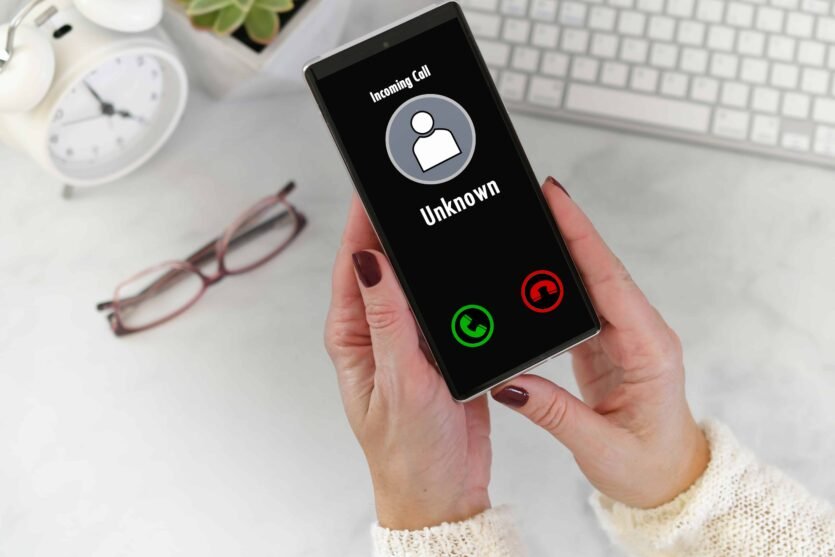9 Steps to Protect Yourself from Telephone Scammers

We may earn a small fee from the companies mentioned in this post.
In today’s world, where technology is becoming more advanced, telephone scammers are also evolving and finding new ways to trick unsuspecting individuals, these can include vulnerable and elderly people.
These con artists prey on people’s trust and vulnerability, and they can be relentless in their efforts. In this article, I will explore the various tactics used by telephone scammers, provide valuable tips to help you identify these scams, and suggest effective prevention methods to keep yourself and your loved ones safe from these malicious schemes.
The information provided within this article will provide the knowledge you require when combating telephone scammers.

What are telephone scams
Scam calls are fraudulent schemes that involve criminals using phone calls, text messages, or voice messages to deceive, manipulate, or exploit victims, with the aim of stealing money, personal information, or both. Scammers often use social engineering tactics and prey on the trust, fear, or emotions of their targets. Some common types of phone scams include:
Tech support scams: Scammers pretend to be from a well-known technology company, claiming that your computer or device has a problem that they can fix remotely. They often ask for access to your computer, personal information, or payment details.
Tax scams: Criminals claim to be from the Internal Revenue Service or other tax agencies, saying that you owe taxes or have made an error on your tax return. They typically demand immediate payment, often through unconventional means like gift cards or wire transfers.
Lottery/sweepstakes scams: Scammers claim that you’ve won a large sum of money, a prize, or a lottery, but you need to pay a fee, taxes, or provide personal information to claim the winnings.
Impersonation scams: Criminals pretend to be a friend, family member, or authority figure (e.g., police, government official) in need of help or assistance, often involving a fake emergency or urgent situation. They may ask for money or personal information.
Robocalls: Automated calls that deliver a pre-recorded message, often trying to sell products, services, or solicit donations. Some robocalls are legitimate, but many are fraudulent and aim to deceive or exploit the listener.
Investment scams: Scammers try to lure you into fake investment opportunities, promising high returns with low risks. They often use high-pressure sales tactics and may even provide fake documentation.
Romance scams: Criminals create fake online profiles to develop relationships with their victims, eventually asking for money, gifts, or personal information, often using a fake crisis or emergency as a pretext.

To protect yourself from phone scams, be cautious when answering phone calls from unknown numbers, never share personal or financial information with unverified callers, and always verify the legitimacy of any unsolicited offers, requests, or demands. Phone scams are preventable, but you need to be aware of the techniques used by scammers to protect yourself.
1. Know the Red Flags
Understanding the common tactics used by scammers is essential in identifying potential scams.
Some red flags to look out for include:
Unsolicited calls from unknown numbers
Pressure to make immediate decisions or payments
Requests for personal or financial information
Promises of prizes, rewards, or investments with high returns
Threats of legal action, arrest, or account closure
2. Identify Mobile Phone Scams
Mobile phone scams are increasingly common, and it’s important to be aware of the different types and how to identify them. Here are some tips to help you recognise and avoid common mobile phone scams:
Unsolicited calls or texts: Be wary of unknown numbers or text messages from unfamiliar sources, particularly those that offer deals, prizes, or claim that you’ve won something.
Phishing scams: These involve text messages or emails that attempt to trick you into providing personal information or clicking on malicious links. Look for red flags like poor grammar, a sense of urgency, or unfamiliar webpage links.
Spoofing: Scammers may impersonate legitimate businesses or government agencies to gain your trust. Verify the legitimacy of the caller or sender by independently finding the organization’s contact information and calling them directly.
One-ring scams: If you receive a call that only rings once and then disconnects, it might be a scam. The goal is to tempt you into calling back, often resulting in high charges. Don’t call back unfamiliar numbers.
Smishing: A variation of phishing, smishing involves text messages that contain malicious links or prompt you to provide sensitive information. Don’t click on links from unknown senders or respond to unsolicited requests for personal information.
Premium rate scams: Be cautious of messages or calls that offer to sign you up for premium services or subscriptions, as they may result in unexpected charges on your phone bill.
App-based scams: Fraudulent apps may appear legitimate but could contain malware or steal your personal information. Only download apps from trusted sources like the App Store or Google Play, and always read reviews before installing.
Tech support scams: Be cautious of unsolicited calls or messages claiming to be from tech support and asking for remote access to your device. Legitimate tech support will not contact you unless you’ve initiated the request.
Free trial scams: Scammers may offer a free trial for a service, but require your credit card information for “verification purposes.” They may then charge you without your consent. Always read the terms and conditions carefully and research the company before signing up.
Stay informed: Keep up to date with the latest scam tactics and trends by following news reports, online forums, and consumer protection agencies.

Remember to be vigilant and trust your instincts. If something seems too good to be true, it probably is. If you suspect a scam, report it to your mobile carrier and local authorities.
Check out my article of protecting yourself from phishing scams
3. You Don’t need to decide now
Telephone scammers often use pressure tactics to try and get victims to make a decision quickly. It’s important to remember that you don’t need to make an immediate decision, and taking the time to verify the legitimacy of the call is crucial. Here are some common telephone scams where you should not feel rushed to make a decision:
Bank or Credit Card Scams: Fraudsters may pose as your bank or credit card company, asking for your personal or financial information. Banks and credit card companies will never request sensitive information over the phone.
Charity Scams: Scammers may pretend to represent a charity and pressure you into making a donation on the spot. It’s important to verify the legitimacy of a charity before making a contribution.
Utility Scams: Scammers may pose as utility company representatives, threatening to disconnect your service if you don’t pay immediately. Utility companies will typically provide written notice before disconnecting services.
Grandparent Scams: Scammers pretend to be a grandchild or other family member in trouble, asking for immediate financial assistance. Always verify the identity of the person and their situation before sending money.

Remember, if you receive a suspicious call, you have the right to hang up and take the time to research the situation or contact the relevant organisation directly.
Never feel pressured to make a decision or provide personal information over the phone.
You may find my article on Identity theft useful
4. Protect Your Personal Information
Never provide personal or financial information over the phone unless you initiated the call and trust the recipient. Keep in mind that legitimate businesses and government agencies will never ask for sensitive details or payments via phone call or text message.
If you receive an unsolicited call, even from a recognised number, always treat the call with caution, even if the caller pertains to be from a reputable organisation, such as your bank or government agency, to gain your trust.
If a caller claims to represent a specific organisation, hang up and call the official number listed on their website or your account statement to confirm their legitimacy.

You should also be cautious of voicemails, if you receive a voicemail from an unknown caller requesting personal information or instructing you to call back, do not provide any information until you have independently verified the legitimacy of the request.
Identity theft is rife, treat your personal Information as you would your money, they are both valuable assets scammers are intent on stealing from you.
5. Register with the Do Not Call Registry
Signing up for the Do Not Call Registry can help reduce the number of unsolicited sales calls you receive. While this won’t prevent scammers from calling, it will make it easier to identify a potential phone scam since legitimate telemarketers should not be calling you.
To register your phone number with the National Do Not Call Registry, you can visit the registry’s website at www.donotcall.gov and follow the instructions provided.
You will be required to provide your name, address, and phone number(s) that you wish to register. Once registered, telemarketers are prohibited from calling your registered phone numbers.
It is important to note that some calls are exempt from the Do Not Call Registry, such as calls from political organisations, charities, and companies with which you have an existing business relationship.
Additionally, the Do Not Call Registry only applies to personal phone numbers, not business phone numbers.
6. Utilise Call filtering and blocking Apps
Implementing call filtering can be done in several ways depending on the type of phone you have and the features available to you. Here are some possible methods:
Using built-in call filtering features: Many smartphones have built-in call filtering features that allow you to block or silence calls from specific numbers or unknown callers. You can usually access these features in the phone app settings. For example, on an iPhone, you can go to Settings > Phone > Call Blocking & Identification to add numbers to your blocked list.
Installing a call blocking App: There are many call blocking apps available for smartphones that offer more advanced filtering features than the built-in options. Some of these apps use crowdsourced databases to identify and block known spam and scam numbers. Examples of popular call blocking apps include Hiya, Truecaller, and RoboKiller.
Using a call screening service: Some phone companies offer call screening services that use artificial intelligence to screen calls before they reach you. The service can determine whether a call is likely to be spam or a robocall based on the caller’s history and other factors, and then either block the call or allow it to go through with a warning.
Setting up custom call rules: If your phone system allows it, you can set up custom call rules to filter calls based on various criteria. For example, you might create a rule that sends calls from certain numbers directly to voicemail or blocks calls from specific area codes.
Implementing advanced call filtering requires some effort and may involve experimenting with different methods to find the best approach for your needs. It is worth the time investment to reduce the number of unwanted calls and protect your privacy.
7. Verify the caller’s identity
If you receive a call from a business, financial institution, government agency or even the police, politely hang up and call the official number listed on their website or in a directory. This ensures that you are speaking with a legitimate representative and not a scammer impersonating them.
If you receive a suspicious call, make a note of the caller’s phone number and name. You can then confirm their identity by contacting the organisation directly using a verified number to confirm the legitimacy of the call.
Spoofing legitimate telephone numbers is very easy for scammers, they can display any telephone number they wish when calling you using number spoofing.
Number spoofing is the practice of disguising the telephone number of the caller to show a different number on the recipient’s caller ID display. This is typically done to deceive the recipient into thinking the call is coming from a different location or organisation.

Number spoofing can be done through a variety of methods, using specialised software or hardware, and social engineering techniques. It is often used by scammers and telemarketers to make their calls appear more legitimate, such as using a local area code or a familiar company’s phone number.
Spoofing numbers has become a widespread problem in recent years, with scammers using various tactics to trick people into divulging sensitive information or making payments as they seem convincing and their telephone number appears to be genuine. These scams can target anyone, regardless of age, gender, or social-economic status, and can result in significant financial losses and emotional distress.
8. Educate Your Friends and Family
Share your knowledge about telephone scams with friends, family, and community members, particularly those who may be more vulnerable to these tactics. By spreading awareness, we can collectively protect ourselves and our loved ones from falling victim to scams.
9. Report Suspicious Calls
If you suspect a call is a scam, report it to the appropriate authorities, such as the Federal Trade Commission (FTC) or your local law enforcement agency. Reporting scams can help authorities track and shut down these operations, protecting others from falling prey to the same tactics.
Conclusion – Telephone scammers
Staying vigilant and informed is the best way to protect yourself from telephone scammers and common phone scams. By knowing the red flags, protecting your personal information, and using call-blocking tools, you can significantly reduce the risk of falling victim to these schemes. Remember, it’s better to be safe than sorry, so always trust your instincts and take the necessary precautions.
Detect telephone scammers – Jon Cosson YouTube Channel
Useful External References
- Action Fraud
- Website: https://www.actionfraud.police.uk/
- Description: Action Fraud is the UK’s national reporting center for fraud and cybercrime. They provide information on various types of scams, including telephone scam, and allow individuals to report fraudulent activities.
With over three decades of experience in the heart of London’s financial sector, I have dedicated my career to the pursuit of robust cybersecurity practices and IT leadership. As a Certified Information Systems Security Professional (CISSP), Certified Information Security Manager (CISM), Certified Chief Information Security Officer (C|CISO), Certified Ethical Hacker (CEH), and Computer Hacking Forensic Investigator (CHFI), I bring a wealth of knowledge and expertise to the table.
My journey in the field of cybersecurity has not only been about personal growth but also about sharing my insights with others. As an international speaker, I have had the privilege of addressing audiences worldwide, discussing the importance of cybersecurity in today’s digital age. My passion for knowledge sharing extends to my work as an author and blogger, where I delve into the complexities of cybersecurity, offering practical advice and thought leadership.
In my role as a CISO and Head of IT, I have overseen the development and implementation of comprehensive information security and IT strategies. My focus has always been on creating resilient systems capable of withstanding the evolving landscape of cyber threats.
My Master’s degree in Cybersecurity has provided a solid academic foundation, which, when combined with my practical experience, allows me to approach cybersecurity from a holistic perspective.
I am always open to connecting with other professionals in the field, sharing knowledge, and exploring new opportunities. Let’s secure the digital world together.


